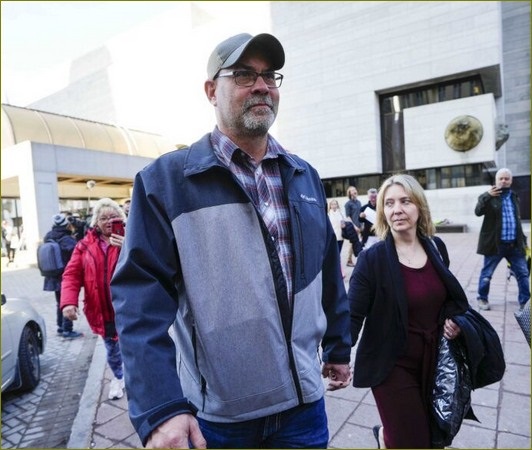Business
US Expands Biometric Technology in Airports Despite Privacy Concerns

Biometric systems promise efficiency at airports, but concerns over data security and transparency persist.
If you’re tired of censorship and surveillance, subscribe to Reclaim The Net.
Biometric technology is being rolled out at US airports at an unprecedented pace, with plans to extend these systems to hundreds more locations in the coming years. The Transportation Security Administration (TSA) is driving a significant push toward facial recognition and other biometric tools, claiming improved efficiency and security. However, the expansion has sparked growing concerns, with privacy advocates and lawmakers voicing concerns about data security, transparency, and the potential for misuse of such technology.
US Customs and Border Protection (CBP) has already implemented its Biometric Facial Comparison system at 238 airports, including 14 international locations. This includes all CBP Preclearance sites and several major departure hubs. CBP says its Biometric Exit program is rapidly gaining traction, with new airport partners joining monthly and positive feedback reported from passengers.
Meanwhile, the TSA has equipped nearly 84 airports with its next-generation Credential Authentication Technology (CAT-2) scanners, which incorporate facial recognition. This rollout is part of a broader effort to bring biometrics to over 400 airports nationwide. These advancements are detailed in a TSA fact sheet aimed at building public awareness of the initiative.
Opposition and Privacy Concerns
Despite assurances from TSA and CBP, critics remain skeptical. Some lawmakers, led by Senator Jeff Merkley, argue that the TSA has yet to justify the need for biometric systems when previous technologies already authenticated IDs effectively. Privacy advocates warn that the widespread use of facial recognition could set a dangerous precedent, normalizing surveillance and threatening individual freedoms.
The debate is closely tied to the federal REAL ID Act, introduced two decades ago to standardize identification requirements for air travel. As of now, many states have failed to fully implement REAL ID standards, and only a portion of Americans have acquired compliant credentials. Reports indicate that fewer than half of Ohio residents and just 32 percent of Kentuckians have updated their IDs, even as the May 7, 2025, deadline approaches.
Biometric Adoption on the Global Stage
Beyond the US, biometric systems are gaining momentum worldwide. India’s Digi Yatra program has attracted 9 million active users, adding 30,000 new downloads daily. The program processes millions of flights while emphasizing privacy by storing data on users’ mobile devices rather than centralized databases. Plans are underway to expand the program further, including international pilots scheduled for mid-2025.
While biometric technology offers alleged benefits, such as faster boarding and enhanced security, it also poses serious risks. Privacy advocates caution against unchecked implementation, especially since, one day, this form of check-in is likely to be mandatory.
The TSA’s aggressive push for biometrics places the United States at the forefront of this global shift.
Alberta
Alberta announces citizens will have to pay for their COVID shots

From LifeSite News
The government said that it has decided to stop ‘waste’ by not making the shots free starting this fall.
Beginning this fall, COVID shots in the province will have to be pre-ordered at the full price, about $110, to receive them. (This will roll out in four ‘phases’. In the first phases COVID shots will still be free for those with pre-existing medical conditions, people on social programs, and seniors.)
The UCP government in a press release late last week noted due to new “federal COVID-19 vaccine procurement” rules, which place provinces and territories as being responsible for purchasing the jabs for residents, it has decided to stop “waste” by not making the jab free anymore.
“Now that Alberta’s government is responsible for procuring vaccines, it’s important to better determine how many vaccines are needed to support efforts to minimize waste and control costs,” the government stated.
“This new approach will ensure Alberta’s government is able to better determine its overall COVID-19 vaccine needs in the coming years, preventing significant waste.”
The New Democratic Party (NDP) took issue with the move to stop giving out the COVID shots for free, claiming it was “cruel” and would place a “financial burden” on people wanting the shots.
NDP health critic Sarah Hoffman claimed the move by the UCP is health “privatization” and the government should promote the abortion-tainted shots instead.
The UCP said that in 2023-2024, about 54 percent of the COVID shots were wasted, with Health Minister Adriana LaGrange saying, “In previous years, we’ve seen significant vaccine wastage.”
“By shifting to a targeted approach and introducing pre-ordering, we aim to better align supply with demand – ensuring we remain fiscally responsible while continuing to protect those at highest risk,” she said.
The UCP government said that the COVID shots for the fall will be rolled out in four phases, with those deemed “high risk” getting it for free until then. However, residents who want the shots this fall “will be required to pay the full cost of the vaccine, the government says.”
The jabs will only be available through public health clinics, with pharmacies no longer giving them out.
The UCP also noted that is change in policy comes as a result of the Federal Drug Administration in the United States recommending the jabs be stopped for young children and pregnant women.
The opposite happened in Canada, with the nation’s National Advisory Committee on Immunization (NACI) continuing to say that pregnant women should still regularly get COVID shots as part of their regular vaccine schedule.
The change in COVID jab policy is no surprise given Smith’s opposition to mandatory shots.
As reported by LifeSiteNews, early this year, Smith’s UCP government said it would consider halting COVID vaccines for healthy children.
Smith’s reasoning was in response to the Alberta COVID-19 Pandemic Data Review Task Force’s “COVID Pandemic Response” 269-page final report. The report was commissioned by Smith last year, giving the task force a sweeping mandate to investigate her predecessor’s COVID-era mandates and policies.
The task force’s final report recommended halting “the use of COVID-19 vaccines without full disclosure of their potential risks” as well as outright ending their use “for healthy children and teenagers as other jurisdictions have done,” mentioning countries like “Denmark, Sweden, Norway, Finland, and the U.K.”
The mRNA shots have also been linked to a multitude of negative and often severe side effects in children and all have connections to cell lines derived from aborted babies.
Many Canadian doctors who spoke out against COVID mandates and the experimental mRNA injections were censured by their medical boards.
LifeSiteNews has published an extensive amount of research on the dangers of the experimental COVID mRNA jabs that include heart damage and blood clots.
Business
Carney’s European pivot could quietly reshape Canada’s sovereignty

This article supplied by Troy Media.
Canadians must consider how closer EU ties could erode national control and economic sovereignty
As Prime Minister Mark Carney attempts to deepen Canada’s relationship with the European Union and other supranational institutions, Canadians should be asking a hard question: how much of our national independence are we prepared to give away? If you want a glimpse of what happens when a country loses control over its currency, trade and democratic accountability, you need only look to Bulgaria.
On June 8, 2025, thousands of Bulgarians took to the streets in front of the country’s National Bank. Their message was clear: they want to keep the lev and stop the forced adoption of the euro, scheduled for Jan. 1, 2026.
Bulgaria, a southeastern European country and EU member since 2007, is preparing to join the eurozone—a bloc of 20 countries that share the euro as a common currency. The move would bind Bulgaria to the economic decisions of the European Central Bank, replacing its national currency with one managed from Brussels and Frankfurt.
The protest movement is a vivid example of the tensions that arise when national identity collides with centralized policy-making. It was organized by Vazrazdane, a nationalist, eurosceptic political party that has gained support by opposing what it sees as the erosion of Bulgarian sovereignty through European integration. Similar demonstrations took place in cities across the country.
At the heart of the unrest is a call for democratic accountability. Vazrazdane leader Konstantin Kostadinov appealed directly to EU leaders, arguing that Bulgarians should not be forced into the eurozone without a public vote. He noted that in Italy, referendums on the euro were allowed with support from less than one per cent of citizens, while in Bulgaria, more than 10 per cent calling for a referendum have been ignored.
Protesters warned that abandoning the lev without a public vote would amount to a betrayal of democracy. “If there is no lev, there is no Bulgaria,” some chanted. For them, the lev is not just a currency: it is a symbol of national independence.
Their fears are not unfounded. Across the eurozone, several countries have experienced higher prices and reduced purchasing power after adopting the euro. The loss of domestic control over monetary policy has led to economic decisions being dictated from afar. Inflation, declining living standards and external dependency are real concerns.
Canada is not Bulgaria. But it is not immune to the same dynamics. Through trade agreements, regulatory convergence and global commitments, Canada has already surrendered meaningful control over its economy and borders. Canadians rarely debate these trade-offs publicly, and almost never vote on them directly.
Carney, a former central banker with deep ties to global finance, has made clear his intention to align more closely with the European Union on economic and security matters. While partnership is not inherently wrong, it must come with strong democratic oversight. Canadians should not allow fundamental shifts in sovereignty to be handed off quietly to international bodies or technocratic elites.
What’s happening in Bulgaria is not just about the euro—it’s about a people demanding the right to chart their own course. Canadians should take note. Sovereignty is not lost in one dramatic act. It erodes incrementally: through treaties we don’t read, agreements we don’t question, and decisions made without our consent.
If democracy and national control still matter to Canadians, they would do well to pay attention.
Isidoros Karderinis was born in Athens, Greece. He is a journalist, foreign press correspondent, economist, novelist and poet. He is accredited by the Greek Ministry of Foreign Affairs as a foreign press correspondent and has built a distinguished career in journalism and literature.
Troy Media empowers Canadian community news outlets by providing independent, insightful analysis and commentary. Our mission is to support local media in helping Canadians stay informed and engaged by delivering reliable content that strengthens community connections and deepens understanding across the country.
-

 Crime1 day ago
Crime1 day agoManhunt on for suspect in shooting deaths of Minnesota House speaker, husband
-

 Business22 hours ago
Business22 hours agoCarney’s European pivot could quietly reshape Canada’s sovereignty
-

 Alberta22 hours ago
Alberta22 hours agoAlberta’s grand bargain with Canada includes a new pipeline to Prince Rupert
-

 conflict8 hours ago
conflict8 hours ago“Evacuate”: Netanyahu Warns Tehran as Israel Expands Strikes on Iran’s Military Command
-

 Aristotle Foundation4 hours ago
Aristotle Foundation4 hours agoThe Canadian Medical Association’s inexplicable stance on pediatric gender medicine
-

 Energy7 hours ago
Energy7 hours agoCould the G7 Summit in Alberta be a historic moment for Canadian energy?
-

 Bruce Dowbiggin7 hours ago
Bruce Dowbiggin7 hours agoWOKE NBA Stars Seems Natural For CDN Advertisers. Why Won’t They Bite?
-

 Crime7 hours ago
Crime7 hours agoMinnesota shooter arrested after 48-hour manhunt








